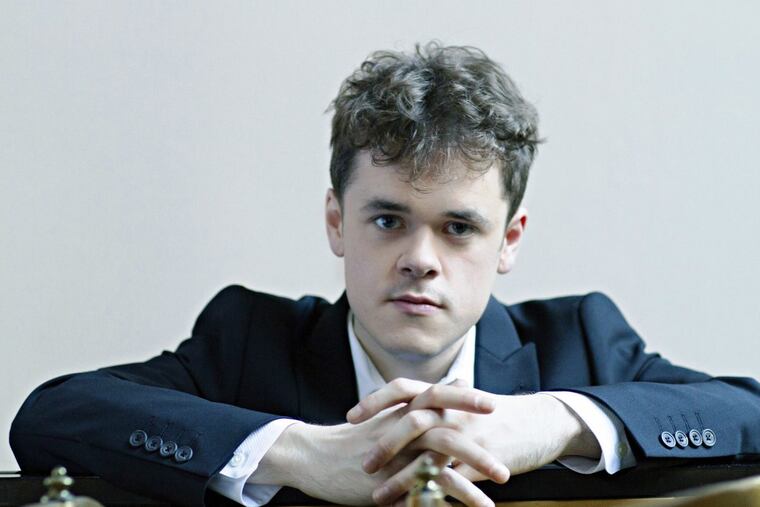Benjamin Grosvenor makes debut at the Kimmel - without the meat and potatoes
The English pianist proved superlative, with a point of view.

Beethoven was banished, Schubert and Mozart nowhere to be seen. Not a single Classical-era composer, in fact, appeared in the Philadelphia debut recital of British pianist Benjamin Grosvenor on Friday night in the Perelman Theater.
It's not a complaint, per se. But these composers are common at Philadelphia Chamber Music Society recitals for a reason. They fill out a portrait of the artist. And if Grosvenor managed to get through an entire program without turning in a complete personality profile, there is still time. He's 25 years old.
Not that the personality he offered was lacking in a point of view. It was a program constructed to his strengths. The encore, Moszkowski's Etude in A Flat, Op. 72, No. 11, was made of elfin runs rendered with the ease of a weightlifter wielding a feather-duster. It's not just that Grosvenor's technique is spectacular; it's that he pulls back on its flash potential to serve a solid musical aim. He and wise restraint are on easy terms.
The only programming miscalculation of the evening might have been the Debussy. Why would a pianist, permitted to choose from the largest repertoire of any instrument, pick a transcription – and a transcription of a piece beloved for its orchestration? In Leonard Borwick's piano translation of Prélude à l'après-midi d'un faune, Grosvenor did not attempt to evoke an orchestra, but rather to replace it in impressive Lisztian tremolos and sparking runs. Mission accomplished.
But the pianist had more important things to say in authentic ways in authentic repertoire. There is a drive in his playing that beautifully flirts with brashness, but goes there only for the best of musical reasons.
He started the last of Brahms' Opus 119 Four Pieces, the "Rhapsody in E Flat Major," in all the brightness of a brass fanfare. But the way he led the line to the end was masterly. The music grew in size of sound, tempo, and intensity, building into a blaze that, at the very end, turned very satisfyingly angry. His way in the other pieces in the set offered strong opinions.
His decision to intersperse the four pieces with three responses to Brahms by contemporary Australian-born composer Brett Dean? I'm not sure that it added much, though I'm certain I would have appreciated Dean's strengths if his three pieces had been done separately, in a set of their own. Putting your work alongside Brahms seems to be an artistic suicide mission.
We are, however, grateful to any pianist who programs Berg's Piano Sonata Opus 1, a one-movement trip to the last seconds of late Romanticism that leaves us off in the happy-to-be-simply-sad key of B minor after 11 minutes of anxious-sad.
He bookended the recital in works far from each other in style, yet potent in ways that exploited his strengths. Bach is a vehicle for personal expression, Grosvenor argued in the French Suite in G Major, BWV 816. What beautiful use of dynamics and tempo to shape the line. The music was always on its way to somewhere, with the extraordinary lightness of his left hand and beautifully turned out ornaments marking points of interest along the way.
If his Debussy wasn't orchestral, his Ravel consciously sought colors variously bright and in shades of gray. Grosvenor's commanding technique dug deep into the imagery of Gaspard de la nuit – the misty world of "Ondine," the nightmarish "Scarbo" who can't be stamped out no matter how hard you try. The pianist's voicings (the weight given to certain notes as opposed to others) in the second movement moved it to a level of drama not often realized by other pianists. He didn't just refer to the corpse swinging from the gibbet – that B flat tolling throughout – but, through pacing and phasing, suggested the despair you felt sitting there watching the face of someone you once knew.